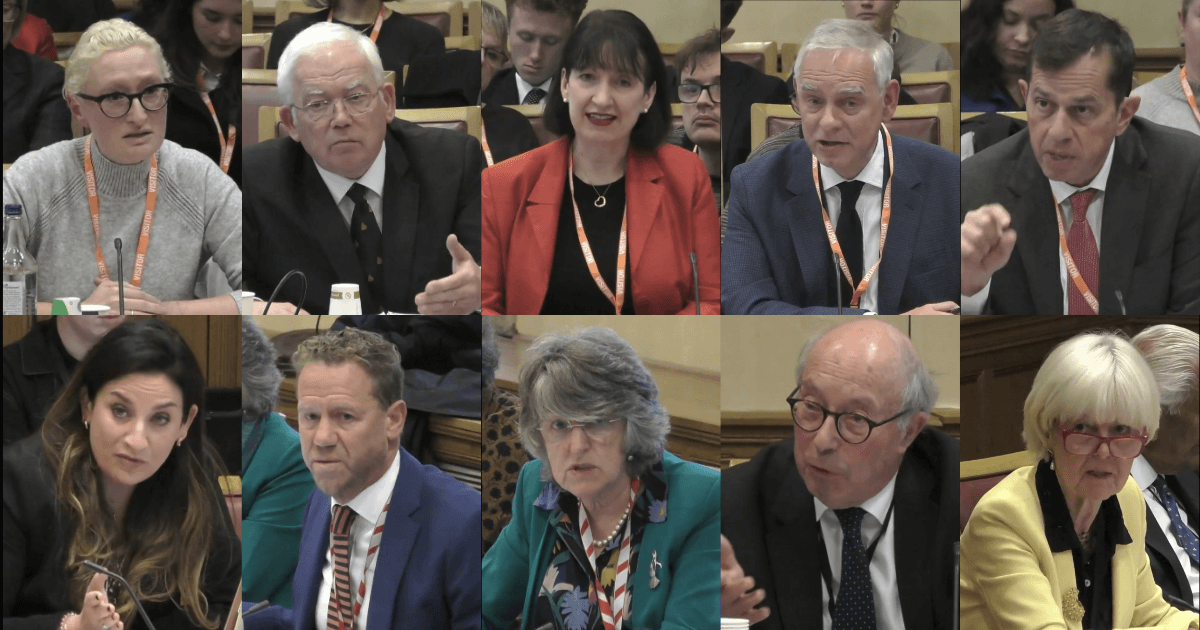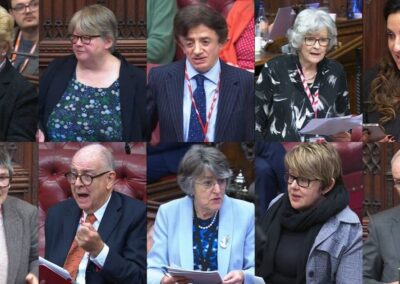The House of Lords assisted suicide Bill select committee held two public sessions last week, allowing a select group of Peers to interrogate and cross-examine the Terminally Ill Adults (End of Life) Bill through expert witnesses. In an unusual and controversial move, the select committee chose not to accept written evidence and only heard from a select few invited witnesses.
The first day of the select committee took place on Wednesday 22 October.. A wrap-up of key moments from the first day can be found here.
The second day took place on Thursday, 23 October. In the first session of that day, Dr Annabel Price, College Lead for the Bill at Royal College of Psychiatrists, and Dr Luke Geoghegan, Policy Lead at British Association of Social Workers presented evidence to Peers.
This was followed in the second session by Dr Suzy Lishman, Lead on Medical Examiners at Royal College of Pathologists; HHJ Thomas Teague KC, Former Chief Coroner of England and Wales at HMCTS; and Professor Aidan Fowler, National Director of Patient Safety at NHS England.
The following contains a summary and key themes of the second day of the select committee.
“Assisted deaths” are unnatural and should be referred to the coroner
Thomas Teague, the former Chief Coroner of England and Wales, highlighted that, if assisted suicide were to become lawful, deaths by assisted suicide should be referred to the coroner for investigation, which is not mandated under the proposed legislation. He said, “Since assisted deaths are by definition intentionally self-inflicted, they are, in my view, both in law and in reality, deaths by suicide and therefore unnatural. Our law has mandated for centuries that all such deaths should automatically go to the coroner for investigation”.
Teague highlighted that recategorising these deaths as natural deaths “may have the unfortunate and unintended consequence of tending to obscure and conceal those risks, making it easier for persons who want, for example, to exercise coercion, pressure or deception to do so”.
Teague continued, stating that the very act of requiring assisted deaths to be referred to a coroner creates “a deterrent against wrongdoing”.
He continued, reiterating that coroners are experts, and that the kind of abuse that individuals could face is exactly the sort of thing they are knowledgeable about.
Dr Suzy Lishman, Lead on Medical Examiners at Royal College of Pathologists, also stated that all deaths as a result of assisted suicide should be notified to the Coroner, as all other deaths following drug administration are.
“The view of the Royal College of Pathologists, the lead college for medical examiners and responsible for their training, is that assisted deaths should be notified to the coroner, just as other deaths following the administration of drugs, prescribed or not, must be”, she said.
The safeguards within the Bill are simply “not enough” for it to be truly safe
Dr Annabel Price, the College Lead for the assisted suicide Bill at Royal College of Psychiatrists, said that even if a psychiatrist were on the assisted suicide panels, it still wouldn’t alleviate the concerns the RCPsych has with the Bill.
“As currently drafted, our view is that the panel does not serve the same function as a multidisciplinary team in clinical practice”, she said.
Dr Price continued, stating that, as assisted suicide is “not a treatment” and so differs from other services provided by medical professionals, there has been no clarity given for what a mental capacity assessment would actually entail.
Dr Price said it is common for people with terminal illnesses to experience depression, experience isolation, and feel like a burden, according to the international evidence. She highlighted that in the scope of the legislation there is “not a clear mechanism to assess for those areas”, and that the RCPsych believes that “those areas are somewhat bypassed in the process”.
Due to “these practical concerns about the assessments of the co-ordinating doctor, the independent doctor and now the panel”, Dr Price outrightly stated that the Royal College of Psychiatrists “could not support the Bill”.
Dr Luke Geoghegan, Policy Lead at British Association of Social Workers, also said it would be “[e]ssential but not enough” for social workers who sit on the panels to be able to access local authority and police records to detect when a person has been subjected to domestic abuse and coercion.
Geoghegan continued, highlighting that because “social care in this country is in crisis and people are not getting the services that they are entitled to”, people who otherwise may not have considered assisted suicide would likely be inclined to do so.
Assisted suicide opponents not being treated fairly during the committee
Baroness Coffey, who is entitled under standing orders to ask questions to witnesses, wasprevented from doing so despite politely addressing the Chair, who had started the meeting early without warning.
Assisted suicide supporter Lord Markham asked questions of Dr Annabel Price, the representative of the Royal College of Psychiatrists, but repeatedly interrupted her when she gave an answer he did not like. “A simple yes or no answer is fine”, he states, despite asking complex, leading questions.
Lord Markham also tried to dismiss evidence from the Royal College of Psychiatrists on the basis of Dr Price’s supposed personal views. She rightly explained that she was speaking on behalf of her College. Many of those in attendance were audibly shocked at Lord Markham’s leading question.
The importance of suicide prevention against radical autonomy
Pro-assisted suicide Peer Baroness Hayter claimed that individuals have an “absolute right” to end their lives by assisted suicide. The former Chief Coroner of England and Wales, Thomas Teague, reminded her that this simply is not the case.
“When the Suicide Act 1961 was introduced, it was not the policy of the law to condone suicide. That is why we have suicide prevention measures. It was said at the time in Parliament, when that Bill was introduced, that the change in the law was not to be taken as in any way condoning the act of suicide. That is why to this day it is still a serious offence to assist in a suicide”, he said.
Dr Price, the representative of the Royal College of Psychiatrists, reiterated that the assisted suicide Bill intends to legislate for a tiny number, but clinicians have a responsibility to everyone. Countless people would be vulnerable if this Bill becomes law.
“Whether or not that gives a clearer message to young people about what it is to end one’s life, we still, as clinicians, have a duty to suicide prevention and we still have a duty to assessing for mental disorder. That will continue whether there is an assisted dying law or not”, she said.
Coercion and pressure could be driving factors for choosing assisted suicide under this Bill
Witnesses said that “pressure”, which is mentioned in the Bill as something to safeguard against, is entirely different from coercion, and that they both require different safeguards.
Dr Price said, “Coercion would be the application of force, threat or fear in order to make somebody do something they did not want to do. Pressure has a broader definition of perhaps strong encouragement, expectation or the worry of letting somebody down. Coercion, in my understanding, can potentially be a crime, whereas pressure perhaps does not fulfil those criteria”.
“We see people in my clinical practice who have been pressured in various ways to do things that they might not have made the decision to do themselves”, she continued.
Dr Geoghegan said, “I think there are going to be some elements of pressure that we cannot manage”.
“[W]e have social care problems”, he continued. “That creates pressure. There is also more personal pressure that may come from family members or partners”.
Several expert witnesses said they had not received any training in their roles to identify pressure or coercion. Dr Suzy Lishman, Lead on Medical Examiners at Royal College of Pathologists, said, “I would understand pressure to mean encouragement to go down a particular route, and coercion to involve some force or threat. I have had no training whatsoever in either of these”.
Professor Aidan Fowler, National Director of Patient Safety at NHS England, agreed, saying, “I have not had training in it, and I think it would be the view of medical examiners that they have not had training and would need it to spot it”.
Professor Fowler continued, “I would concur that, from the medical examiner point of view, apart from some who clearly have a view on assisted dying overall, the big concern among medical examiners is their ability to spot coercion in order to then refer it on to the coronial system, and that is the anxiety we would need to deal with”.
“In implementing it, if there was a decision that medical examiners should carry out first scrutiny, we would have to think very carefully, as has been discussed, what provision is made for medical examiners to feel confident that they have the best chance of picking up coercion, should it occur”.












